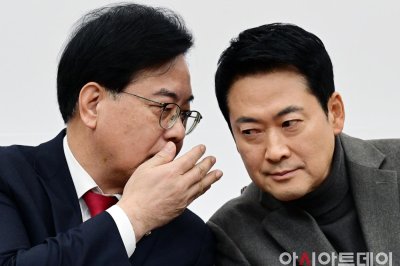PPP tensions flare after Yoon life sentence

People Power Party leader Jang Dong-hyuk (Right), speaks with floor leader Song Eon-seok (Left) during a Supreme Council meeting at the National Assembly in Seoul on Thursday. Photo by Asia Today
Feb. 19 (Asia Today) — Internal divisions resurfaced within the conservative People Power Party on Thursday after former President Yoon Suk Yeol was sentenced to life in prison in a first-instance ruling on charges of leading an insurrection.
Younger lawmakers within the party called for an apology and a clear break from Yoon, while party leader Jang Dong-hyuk refrained from issuing an immediate statement.
The party said it plans to announce an official position as early as Friday after gathering views from within the leadership and rank-and-file members. Chief spokesperson Choi Bo-yoon said a consolidated statement is likely to be released after further deliberation.
Some party members interpreted Jang’s silence as a strategic move aimed at broadening the party’s appeal to centrist voters. In a television interview the previous day, Jang said “transition is more important than severance,” a remark seen by some as signaling a shift toward focusing on economic and livelihood issues rather than internal factional conflict.
However, several figures urged the leadership to distance the party from what they described as “Yoon Again” supporters.
Seoul Mayor Oh Se-hoon said he felt “devastated” by the court’s ruling as a member of the party that produced the former president and argued that cutting ties with Yoon is an unavoidable step for the conservative movement.
Lawmakers affiliated with the reform-minded group Alternative and Future also called for an official declaration of separation from pro-Yoon factions, warning that continued alignment with far-right elements could harm the party’s future.
The group urged the leadership to demonstrate “new leadership that unites rather than divides,” as the party weighs its response to the unprecedented life sentence handed to a former president.
— Reported by Asia Today; translated by UPI
© Asia Today. Unauthorized reproduction or redistribution prohibited.
Original Korean report: https://www.asiatoday.co.kr/kn/view.php?key=20260220010005937
